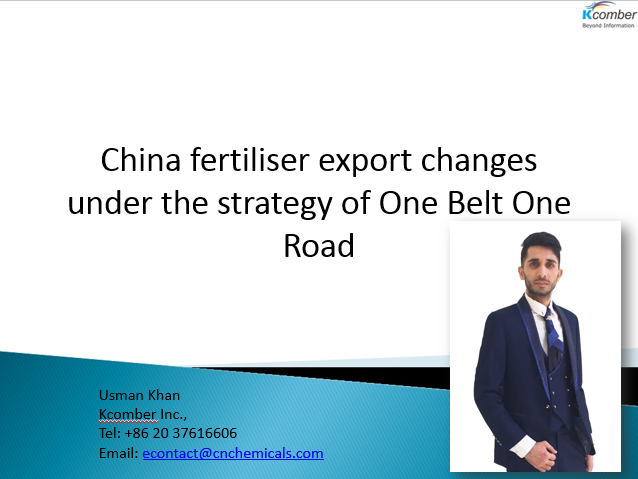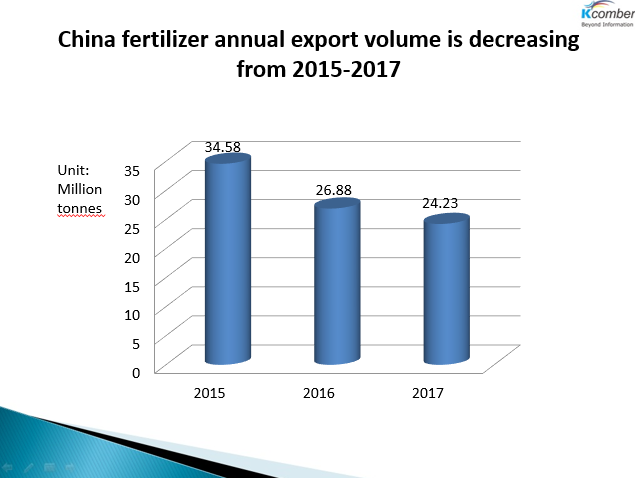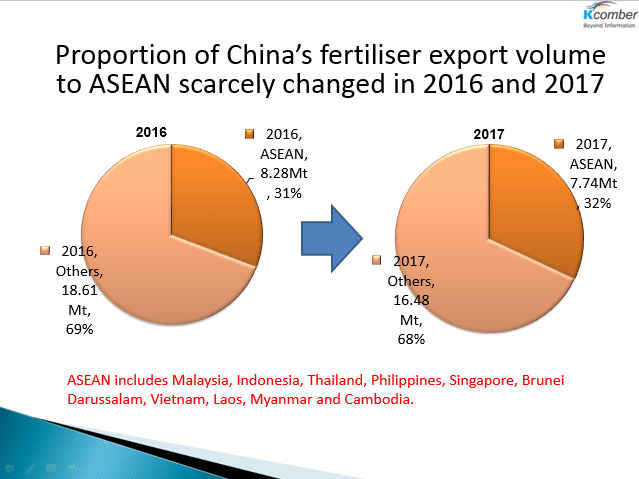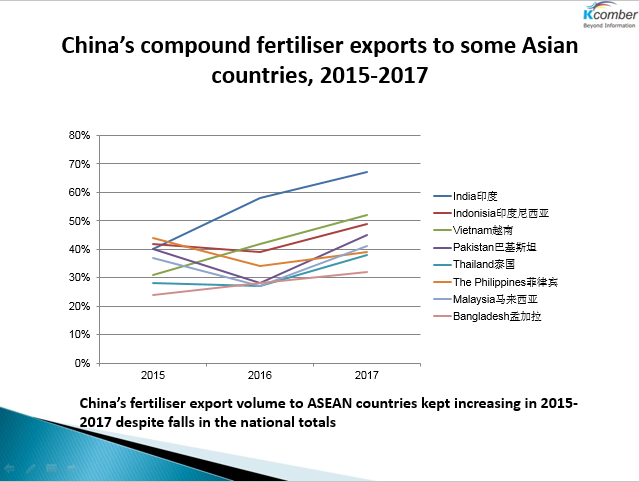Our team takes part in
the 19th China International Agrochemical & Crop Protection Exhibition (CAC
2018) in Shanghai. Known to be one of the research and opinion leaders of the
Chinese agrochemicals market, Kcomber’s General Manager Usman Khan has given a
presentation on the first day at the 9th China International Fertiliser Show
(FSHOW 2018), that comes together with the CAC. In the speech, he outlined the
development of China’s fertiliser industry to the crème a la crème of China’s
fertiliser leaders and gave recommendations of how to deal with the
development.

Mr
Khan started the presentation with an overview of China’s fertiliser industry
from 2015-2017. During this period, the market saw year-by-year falls in
fertilisers export volume from China.

Source: CCM
According
to Mr Khan, there are several reasons for the development. First of all, the domestic supply and demand situation.
Large quantities of obsolete production capacities were phased out for the
supply-side structural reform carried out by the Chinese government.
Preferential policies for fertiliser production were removed and the demand
fell stably, due to the Proposal to
Take Actions to Achieve Zero Growth in Fertiliser Use by 2020 unveiled
by the Ministry of Agriculture of the People’s Republic of China. Lastly,
production cost was increased because of the inspection for environmental
protection mainly.
The trade structure is
another reason. China mainly exported basic fertilisers such as urea and
phosphate fertiliser, which were disadvantaged for their high cost and poor
competitiveness. By contrast, the urea business in the USA developed
vigorously, based on the large-scale production of shale gas. From 2016-2017, a
total production capacity of 3.70 million t/a was constructed in the USA, and
the figure will rise further by 360,000 t/a in 2018. The USA may change its
role, from a large urea importer to an exporter, according to Mr Khan’s
insights. In addition, OCP Group exploited its advantages in phosphorus
resources to the full and expanded its production capacity. In 2018, another
800,000 t/a phosphoric acid production line is to run, and its production
capacity of granular phosphate fertiliser will surpass 12 million t/a. The
significant expansion in fertiliser production capacity and the fiercer
international competition are increasing threats to China’s traditional
fertiliser business.
Under
such circumstances, domestic fertiliser
makers are expected to go abroad, so as to give full play to both domestic
and foreign markets, is the result of Mr Khan.
Where to go: along Belt
and Road
As
the next topic, he spoke about the role of the Belt and Road project in the
fertiliser industry. South Asian and
Southeast Asian countries along the Belt and Road are targets in particular.
Their agriculture businesses, which demand many agricultural means of
production (AMP) such as fertiliser, still play a vital role in their national
economies. Their fertiliser outputs are low, restricted by the economic
conditions, production facility and technology and soil management.
Specifically, they import large quantities of nitrogenous fertiliser, phosphate
and compound fertilisers and potash fertiliser. Hence, they are the first
choices to the domestic fertiliser business. According to China Customs,
China’s exports of fertilisers to the countries under the Association of
Southeast Asian Nations increased in 2016 and maintained stability in 2017,
despite falls in the national totals. It is of great significance to export the
domestic advanced fertiliser and pesticide production facilities, production
technologies and quality products to the countries along “B&R” (strong
demand, short shipment distance and low shipping cost, if the domestic AMP
suppliers intend to achieve internationalised development.

Source: CCM
How to go abroad: to
develop new products and new technologies with a focus on compound fertiliser
According
to Mr Khan, the domestic fertiliser business is not aimed at earning foreign
exchanges through exports but instead is to guarantee the domestic agricultural
production, especially to ensure the long-run and sustainable production of
grains. In 2017, the Chinese administration issued the “zero tariffs” policy on
part of the fertilisers, a move intended to get the business out of trouble.
This policy will continue in 2018, so as to manage the conflict brought by the
full-year production and the seasonal demand.
Furthermore,
the export of fertilisers is mainly to
protect the business and the production capacity, he explained next. For
one thing, idle production lines may run and the economic effect may be
achieved when it is the off-season. Such a continuous production will enable
enterprises to reduce costs and better solve problems in environmental
protection and safety. For another, if an enterprise has relative overcapacity,
it is capable of flexible supplies. This will contribute to better protection
of domestic agricultural production.
The
export of compound fertilisers is very different from the export of either urea
or phosphate fertiliser, as compound fertilisers are of high added-value. This
business will export technology, services, talents and even brand image, in
addition to product. By contrast, exports of both urea and phosphate
fertiliser are only exports of bulk commodity.
Under
this, the export of compound fertilisers
is much more profitable than that of urea and phosphate fertiliser which face
homogenization. It is notable that this business must be supported by
strong technical teams and agrochemical services and must be tightly connected
with local agricultural production abroad. During this, the domestic fertiliser
enterprises will build their images in the world and many well recognised
multinational enterprises will emerge, like Kingenta Ecological Engineering
Group Co., Ltd., Stanley Agriculture Co., Ltd., Shenzhen Batian Ecological
Engineering Co., Ltd. and Shandong Hongri Chemical Joint Stock Co., Ltd.
The
tariff policies which are increasingly favourable for the export of compound
fertilisers have been issued in recent years. This also gives impetus to the
development of the domestic compound fertiliser business. Compared to developed
countries, China-made fertilisers are composited in a relatively low way.
However, the development of high-efficiency, labour-saving compound fertilisers
has become a trend in the world. It is expected that the favourable policies
issued will encourage the domestic enterprises to make greater efforts to
develop technologies related and to carry out production, and meanwhile to lead
the domestic fertiliser business to make transformation and upgrading.

Source:CCM
According
to China Customs, Mr Khan outlined in front of the audience, compound fertiliser has made up an
increasing proportion of the national total exports of fertilisers which
have decreased for years. Reportedly, Thailand imports 1 million tonnes of
compound fertilisers annually and the average annual growth rate of Vietnam’s
compound fertiliser consumption is approximately 5%. Meanwhile, the overall
consumption of compound fertiliser is estimated to further increase thanks to
the enhanced public awareness of balanced fertiliser usage. Obviously, it plays
a decisive role in the domestic fertiliser export business. Hence, it is a key
way for the domestic fertiliser enterprises to develop a succession of new
products, new technologies and new businesses with a focus on compound
fertiliser if they intend to go abroad.
Leading enterprises
going abroad
According
to Mr Khan, Kyrgyzstan-based fertiliser plant with an investment of USD200
million made by Hebei Baidoujia Fertiliser Co., Ltd. is to be constructed soon.
It is to produce over 600,000 tonnes of fertilisers such as urea, phosphate
fertiliser and compound fertiliser per year. In addition, the company planned
to take this opportunity to penetrate into the local seed, pesticides and
agricultural machinery businesses and to facilitate the integration of grain
deep processing and livestock breeding.
Jiangsu
Huachang Chemical Co., Ltd. have for consecutive 3 years ranked 1st regarding
the exports of compound fertiliser from China. In order to expand the shares in
the international market and spread the domestic experience on fertiliser
business development, the company has set up a joint venture in Malaysia, which
is aimed at promoting formulated fertilisers based on nitrogen, a byproduct
from the production of ammonium chloride and ammonium sulphate. Meanwhile, the
company has established a team with domestic key players such as Henan Jinshan
Chemical Co., Ltd. to make demonstrations and carry out tests and promotions of
fertilisers and to share the domestic experience on soil test based formulated
fertiliser in the countries and regions along the “B&R”.
Hubei
Xinyangfeng Fertiliser Co., Ltd. is now selling its products worldwide. In the
past 12 years, it has stepped into 30+ countries and regions in Asia, America,
Oceania and Africa and its portfolio spanning granular mono-ammonium phosphate,
powder mono-ammonium phosphate and nitrogenous and phosphate compound
fertilisers, has been marketed widely. Besides, it has acquired Australia-based
Kendorwal Farm, a move into the world’s premium agricultural and animal
husbandry business. Now the company is clear about its international strategy:
that is, to achieve internationalisation of technology, production capacity,
trade and resources and to go globalised.
Kingenta,
as a leading enterprise in the domestic new type fertiliser business, plays a
benchmarking role in view of all-round internationalisation. Recent years have
witnessed: 1) its acquisitions of and share-participation into many world’s
well-known enterprises which are involved in agricultural business, such as
Germany based COMPO EXPERT GmbH; 2) its construction of branches in many
countries and regions including the US, Australia, India, Spain, Norway,
Israel, Germany, the Netherlands, Vietnam and Singapore; 3) its establishment
of partnerships with 7 foreign universities such as University of Florida and
Norwegian University of Life Sciences and 3 test stations under the United
States Department of Agriculture, in addition to its business activities in the
domestic 10+ bases.
As
the conclusion for the presentation, Mr Khan suggested, the domestic fertiliser enterprises should take
technology innovation as a fundamental strategy in their sustainable
development, pay close attention to development trend of the international
fertiliser business, increase the development of new products and new
technologies and the transfer of scientific achievements, and strengthen the
reform on supply side. All these will help the enterprises establish a
technology innovation system combining them with industry, academia and
research, build international images and brands, win consumers around the world
and gain recognition worldwide.
About CCM:
CCM
is the leading market intelligence provider for China's agriculture, chemicals,
food and feed.
Do
you want to find out more about the agricultural and agrochemicals market in
China? Try our Newsletters and Industrial Reports or join our professional
online platform.